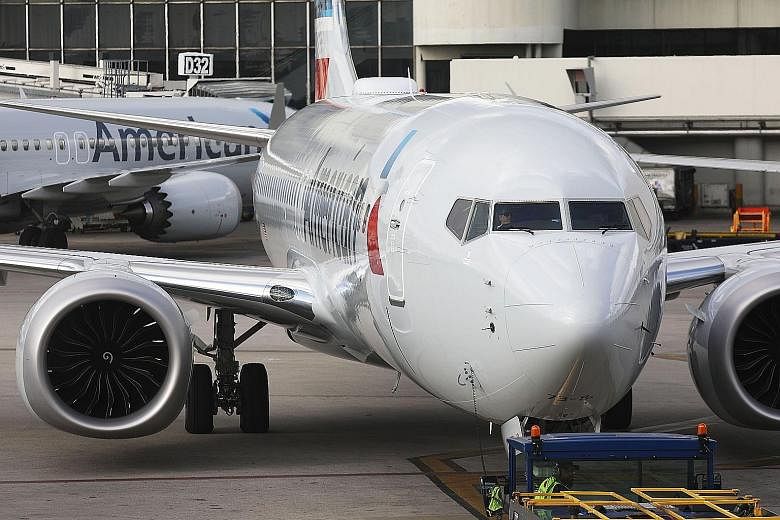As affected travellers in the United States scrambled to rebook their flights in the wake of Wednesday's announcement that the country was grounding its Boeing 737 Max fleet, many questioned why it had been so late to do so.
The emergency order was issued on Wednesday afternoon by the Federal Aviation Administration (FAA), which had been saying for days that the Boeing 737 Max planes were airworthy despite the crash of an Ethiopian Airlines flight of the Max 8 model, even as regulators around the world grounded the aircraft or banned them from their airspace altogether.
The FAA said its order was prompted by new evidence gathered from the Ethiopian Airlines crash site on Wednesday which, together with newly refined satellite data of the aircraft's flight path, indicated similarities with the Lion Air flight that crashed on Oct 29 last year, killing all 189 people on board. The Lion Air aircraft was also a Max 8.
The emergency order was made independently of other countries, FAA acting administrator Daniel Elwell told CNBC in an interview on Wednesday.
The initial data that the US received had been incomplete and raw, but the fresh data on Wednesday showed that the Ethiopian Airlines flight path had been similar enough to that of the Lion Air flight to warrant the grounding of the planes, he said.
When asked why the FAA was the last to act, he said: "We were certainly aware of what was going on around the world, but we didn't feel global pressure. We are a data-driven, action-oriented agency and we don't make decisions about grounding aircraft... without actionable data. In this case, the actionable data didn't arrive until today. I can't speak to the motivations of other countries, but for us, it was an independent decision."
Canada had made the same decision to ground Boeing 737 Max aircraft hours before the US, citing the fresh evidence as well.
US President Donald Trump and Boeing separately characterised the grounding of the aircraft as a precaution that acknowledged travellers' fears.
"We didn't have to make this decision today. We could've delayed it. We maybe didn't have to make it at all, but I felt it was important both psychologically and in a lot of other ways," Mr Trump told reporters in the White House.
"The safety of the American people and all people is our paramount concern," he added.
Boeing said it had recommended to the FAA the temporary suspension of operations of its entire global fleet of 737 Max aircraft after consulting the FAA, the National Transportation Safety Board, as well as aviation authorities and customers around the world.
The decision was made "out of an abundance of caution and in order to reassure the flying public of the aircraft's safety", said Boeing in a statement on its website on Wednesday.
Following the US move, Brazil also grounded the Max planes, becoming the first major Latin American nation to do so in the wake of the Ethiopian Airlines disaster.
In a statement, the National Civil Aviation Agency of Brazil said it made its decision after consulting the US authorities, Boeing and local carriers.
Across America, passengers on cancelled flights queued at airport counters, called customer service hotlines or visited airline websites and were rebooked on different flights or put on other planes.
Passengers of Southwest Airlines, for instance, were allowed to reschedule their flights within 14 days of their original travel dates at no additional cost.
Other passengers, who had cancelled or rebooked their flights in the days before the grounding to avoid flying on a 737 Max aircraft, took to social media to ask for the fare difference to be refunded.
But few disruptions overall were reported, given the small proportion of Boeing 737 Max 8 and 9 aircraft in American fleets.
Southwest Airlines has 34 Boeing 737 Max 8 planes, which account for under 5 per cent of its daily flights, while American Airlines has 24 Max 8 planes, which operate 85 out of its 6,700 flights each day. United Airlines has 14 of the larger Boeing 737 Max 9 planes, which have also been grounded.
Canadian carriers Air Canada and WestJet grounded their 737 Max aircraft earlier on Wednesday.
Mr Trump said the planes will remain grounded until Boeing comes up with a solution.

